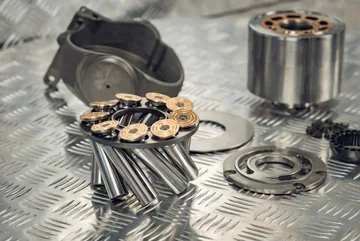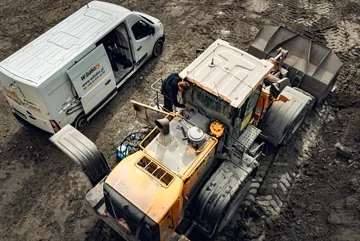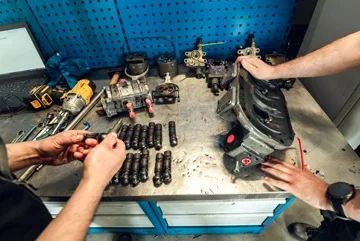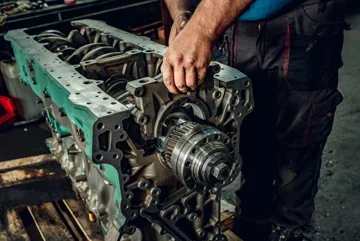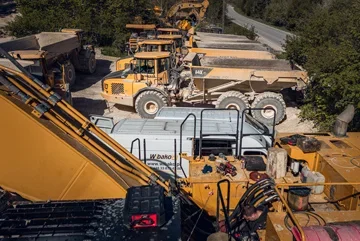Hydraulic filters are fundamental
Hydraulic filters are used to filter hydraulic oil so that it does not contain impurities that can negatively affect the other components of the system.
According to the saying that "forewarned is forearmed", one should keep in mind the condition of the filters responsible for the cleanliness of the oil, in order to prevent possible failures that may arise as a result of their neglect.
Basic maintenance activities of a construction machine are an effective way to extend the life of any type of machine.

What is the structure and how do filters work?
A hydraulic oil filter is usually a stainless steel construction. Additionally, it is equipped with a reinforcing mesh, and filter paper - made of fiberglass, all of which is located in the filter housing.
The mentioned elements are properly constructed to retain particles of impurities - dust, sediments, metal particles or other solid particles that may be in the hydraulic oil.
The hydraulic oil flowing through the filter is cleaned of most particles that may linger in it. After passing through the filter, the hydraulic oil is cleaned of most impurities and becomes clean and safe for further use in the hydraulic system.

What are the types of hydraulic filters?
Hydraulic filters can be divided into:
- Suction filters - placed on the suction line, i.e. between the oil tank and the pump. They are used for preliminary cleaning of the oil from larger waste, such as sand or stones, which can damage pumps and other elements of the hydraulic system.
- Return filters - remove impurities in the fluid returning to the tank from the hydraulic system after work.
- Low pressure filters - remove larger impurities and protect system components from damage. These filters are mounted on low pressure lines.
- High pressure filters - they are used in hydraulic systems where performance at high pressure values is required.
- Inlet filters - they are placed where the hydraulic oil is introduced into the tank. In this way, the oil is cleaned of impurities before it gets into the hydraulic system. The filter design allows for the capture of larger elements, such as metal particles.

Why are hydraulic filters so important?
Filters are an essential protection for hydraulic oil, which is used to transmit energy in the form of pressurized fluid to individual components of the hydraulic system. This allows the operation of individual machine elements, such as cylinders, engines, or valves.
Caring for oil filtration can be classified as basic practices directly affecting the lifespan of a construction machine.
However, in order for the machine to maintain efficiency and performance and longevity of the hydraulic system, it is necessary to keep it in optimal condition. Here, hydraulic filters play a key role.
The task of hydraulic filters is to remove solid particles, sediments, or water impurities, which can negatively affect the quality of the oil, and thus the performance of the entire hydraulic system.
With use, hydraulic oil can wear out and become contaminated. Lack of filter replacement and neglect of this element can lead to machine downtime, caused by a serious failure.

What are the symptoms of overworked hydraulic oil?
Certain symptoms can be clues for the operator that something is not right in terms of the operation of the hydraulic system and this may indicate a decreased quality or even wear of the oil:
- Overworked hydraulic oil may have an unusual color - darker or cloudy. This may be a sign that there are impurities in it.
- Loss of oil's lubricating and cooling properties can be manifested by the overheating of the hydraulic system - higher temperature during operation is a clear warning sign for the operator.
- The appearance of disturbing noises during the operation of the hydraulic system may also be caused by the degradation of hydraulic oil.
- Loss of power, control problems, and slower movements of machine elements may also be the result of worn oil hydraulic.
- Overworked oil can cause accumulation of sediments in the hydraulic system, and thus clogging of filters and other elements.
- If the hydraulic oil has lost its anti-corrosion properties, rust may appear on metal elements.
- Another symptom may be the increase in energy consumption by the hydraulic pump. This is manifested by increased fuel consumption by the internal combustion engine.
It should be noted that the symptoms listed above may be caused by other problems present in other systems and therefore diagnosis and possible repair should be entrusted to a specialized service.

How often to change hydraulic oil?
There are several general guidelines to consider when determining the intervals for changing hydraulic oil. The first and basic step is to familiarize yourself with the user manual provided by the manufacturer, which usually contains information about the time intervals that should be considered during oil change. In the case of construction machines, engine hours (mth) are used as a unit of machine time - it is the difference between the start and end time of the machine's work.
So how often should you change the hydraulic oil in our machine? The answer, as usual, is not so clear, but it is generally accepted that it should occur within 500 - 2000 mth. Alternatively, you can assume that once every 2 years, but in reality it largely depends on the operation and type of machine you have.
Along with the oil change, the filters should also be replaced, to maximize the safety and efficiency of the machine for a longer time.













